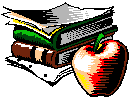 Rethinking
The Academy:
Rethinking
The Academy: Rethinking
The Academy:
Rethinking
The Academy:One example of another, more radical paradigm that sees knowledge and even the way we display and structure that knowledge as temporary and provisional is the creation of a database. Scholars and students define terms within a specific area of knowledge using a given set of protocols via such means as e-mail and connectivity programs like IBM/Lotus Notes.
The definitions include full use of secondary sources, cited in a manner appropriate to the discipline and used in such a way as to avoid a violation of copyright laws. The definitions are then placed on the Internet in an accessible directory (for example, now the Web, then a gopher site) and other scholars are encouraged to use the definitions for their own work.
These can be added to in a variety of ways - scholars who are researching a particular project can add their own comments and specialized definitions to the initial entry, or attach further secondary sources as a second and further proof of the accuracy of the original entry. Thus, a community of scholars works together to build a set of definitions that can then be used both by that group and by the wider community of scholars throughout academe.
RHETGLOS, a part of the PRE/TEXT Conversations, was one such attempt. Though it is currently dormant, Beth Burmester of the University of Illinois at Chicago, is attempting to revive it and make it a resource for compositionists. The PRE/TEXT Conversations (PTcs) were described as:
. . . a moderated, electronic forum to develop a textbase for teachers and theorists of rhetoric. Various parts of PTcs [the PRE/TEXT Conversations] (those identified as cycles) are conceived as note-taking collectives which have a dialogical format. PTcs is a way of sharing ideas, remarks, information, and also "research notes" inter-actively on issues related to rhetoric and cultural studies. Some of the conversations in PTcs can be regarded as chats but other presuppose entries into a hypertextually oriented database in which collaborators agree to deposit their notes for each others' benefit.
RHETGLOS in particular was described as "a cycle on rhetorical terminology. The idea of this sublist [of the PRE/TEXT Conversations] is to develop a glossary of rhetorical terms following lexicographical principles for the use of members of AEE and subscribers to PRE/TEXT [the print version, available by standard subscription] or PTcs [the electronic version of PRE/TEXT and available to anyone who had access to the Internet] (PRE/TEXT Conversations).
Last Modified: August 2, 1996
Copyright © 1996 by Keith Dorwick